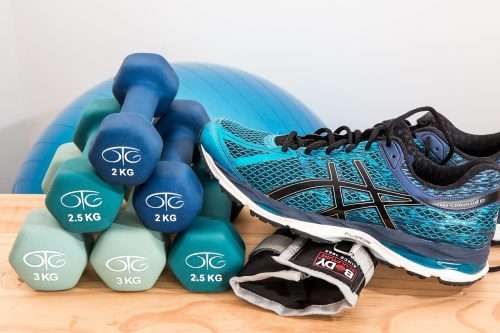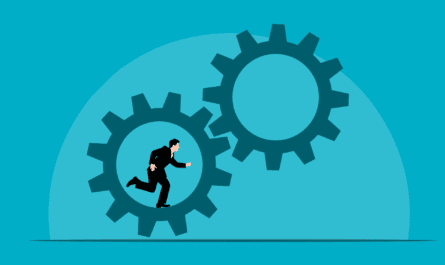I always considered September as the month of new beginnings. From school to university to returning from summer holidays back to work, September seemed like a good month to start new classes, start or resume a diet-exercise plan, and kick off new habits. Yet, research by psychologist Katie Milkman shows that for most people the “fresh start effect” takes place in January. This is when they decide their new year’s resolutions, and when 80% abandon them already before the end of the month. Well, let us be in the 20%!
Welcome, COVID-19. Goodbye, mood.
Last year, as COVID-19 settled in, I became more and more unsettled. The cancelled trips, which I used to view as oases in the desert of daily life, the lack of movement, the rare meetings with friends and family, the uncertainty in planning anything, all contributed to making me restless, yet lazy; both in body and spirit.
My wife, Dora, and I started working out indoors. We were taking good care of our diet. I was sleeping 7-8 hours per night. Around September, I began working on my new novel again. Yet, I was still very sluggish and sometimes withdrawn, which meant one thing: I needed a thorough review on my well-being.
I often struggled in the past with establishing new habits. It was because I wanted to do something new without understanding why it was important for me. If you are the same, give it some thought before you write your new year’s resolutions. Maybe start from the reasons, and the conclude with the actions, like I do below.

New year’s resolutions for the body
According to my step tracker in 2020, I was at just 25% of my 2019 activity. Thanks to COVID-19, I didn’t have anywhere to walk to and I never really enjoyed running outdoors, so my energy levels plummeted. I now admit, I could have done better, but at the time it felt like a vicious cycle: I didn’t exercise more because I didn’t have the energy, and I didn’t have the energy because I didn’t exercise more. Not only that, but as I was only doing strength training indoors, my flexibility deteriorated, which often caused pinched nerves and muscle aches.
Because of not going out much, I did not get enough sunlight. Moderate sun exposure is critical for sustaining healthy levels of vitamin D, which leads to improvement in mood and energy, beyond many other health benefits. During the winter I usually take D3 supplements, but this year I often forgot. My lesson was that not only I needed to become more active and consistent, I needed to introduce more variation in my activity.

New year’s resolutions for the brain and mind
Our brain controls and regulates our volition, feelings, emotions, thoughts, fears, memories. As the most precious organ for a healthy and meaningful life, it is also the most demanding. Although it represents 2% of our weight, it consumes 20% of our energy. Here are a few things I considered for my new year’s resolutions.
Diet, exercise, sleep
As these make up the baseline for a healthy brain, they are here only as honorary mentions.
Social interaction
We are social and curious animals. This year, I missed the interaction with people and especially friends and family. Lack of social interaction has a negative impact on our well-being. Last year it was the pandemic, this year it could be a career that requires 50-hour weeks, leaving no room for meaningful connection with other people. And no, social media friends and followers don’t count at all.
Unproductive activities
It was right after watching the “Social Dilemma” documentary when I started reducing my social media activity. Taking all this unnecessary information affected my focus and attention, while creating false reference points. This is no small thing. People on social media post their best moments and this is fine. However, our brain cannot help but compare our overall life to these best moments of the others, which can lead to depression and feelings of inadequacy. This is besides the actual harm that some of these social media algorithms cause on some groups of people. I now only spend 10-15 minutes on social media, usually during idle time. Judging on the improvement I’ve already seen in my cognitive abilities, this is more than enough.
Nature
Spending at least 120 minutes a week in nature is associated with good health and wellbeing. This is not just the title of another study. More and more cities integrate nature in their infrastructure. For many of us who live confined in apartments, exposure to nature is often limited to park visits. It is great, but maybe not enough. This year I took it one step further and started a small greenhouse at our balcony. Believe it or not, being around and caring for plants has a positive impact on our well-being, productivity, and relationships.

New year’s resolutions for the soul (or whatever you call what gives meaning to your life)
At 36, being engaged to an amazing person, having healthy parents and close friends, holding a good job, and knowing my true calling, I have every reason to be sane and happy. And I am; yet I’m not always mindful, not to mention “liberated” (in the Buddhist sense) from attachments and cravings. I consume moments of my life in an absent-minded, mechanical way, I am prone to impulsive online shopping, and I am restless when I see something I want and I don’t have. And I am definitely not part of a community to which I can give back. I’m afraid this last point is one of the important things many international professionals miss out on.
I already write, which is a relief for me after abandoning for a few years what I considered my calling. I also meditate, and this has helped me enormously in the last three years. However, when my writing ends, my sense of flow disappears, and when my meditation session is over, my mindfulness often takes a back seat.
The search for meaningfulness in my daily life led me to two Coursera courses: “The Science of Well-Being” by Yale University and “Buddhism and Modern Psychology” by Princeton University. They are so good that I aim to convert my notes into a series of blog posts.
It’s never too late for a new direction
The two courses above became important to me not only because of the knowledge I’ve been gaining but also because they contributed towards a new idea:
How could I leverage my educational background and my working experience in talent development to do something productive and meaningful both to me and other people? The answer was Coaching.
“Life Coaching” has still a negative connotation for me, mainly because we now associate it with fake positivity messages by “inspirational” speakers. However, I do see a great value in positive psychology and coaching, and especially performance and leadership coaching. Helping people demonstrate true leadership skills in their daily and professional life can only lead to a better reality for them and their environment. With my educational background, and the fieldwork I have been doing with hundreds of leaders, it sounds like a good direction for me.

Finally, my New Year’s resolutions:
- Practice yoga every day for 15′
- Start running 1-2 times a week (even in the cold)
- Maintain a good sleep hygiene
- Stick to a healthy diet (no calorie counting)
- See my friends and family more, or talk to them on the phone
- Keep social media activity to a maximum of 15 minutes per day
- Spend more time in nature with Dora
- Take care of my vegetable greenhouse
- Keep up daily meditation for at least 15′
- Write and read every single day
- Do more online courses in familiar and brand new areas
- Complete an ICF-accredited coaching course
- Be there, be mindful
I aim to be in the 20% of the people who stick to the new year’s resolutions and finally achieve them. I will write a follow-up post to track my progress. If it is already March and I haven’t written it, hold me accountable by posting a comment below. External accountability is a major factor in establishing new habits.






2 thoughts on “New Year’s resolutions and the “fresh start effect””